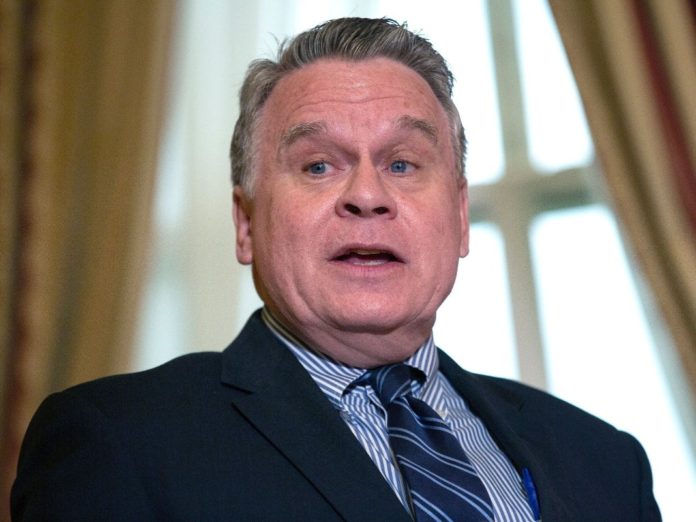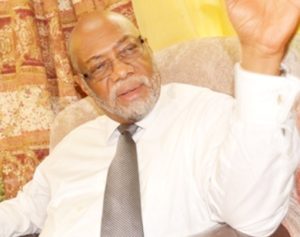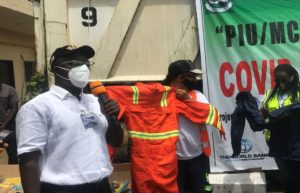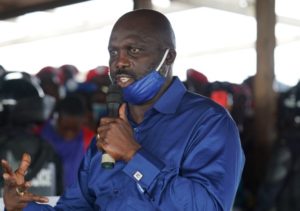
Rhode Island, U.S._ A U. S. Congressional bi-partisan Human Rights Commission on Wednesday, March 24, 2021 heard testimony that the Government of Liberian President George M. Weah is engaged in “political corruption”.
The Tom Lantos Human Rights Commission co- chaired by Democratic Congressman Jim McGovern of Massachusetts’s 2nd Congressional District held its first hearing of the 117th Congress to examine how well the Global Magnitsky Human Rights Act is working around the world.
The Congressional Research Services notes that, “The Global Magnitsky Act takes the terms of a prior Russia-focused law, the Sergei Magnitsky Rule of Law Accountability Act of 2012 (title IV of P.L. 112-208; 22 U.S.C. §5811 note), to the global stage. Sergei Magnitsky, a tax lawyer and auditor in Russia, documented rampant tax fraud and other corruption by individuals associated with the Russian government.
Magnitsky was arrested in November 2008, reportedly for tax evasion, and denied medical care, family visits, and due legal process. While in custody, he was reportedly beaten and possibly tortured. He died in prison in November 2009.
Congress passed the Sergei Magnitsky Act to require the President to identify the person(s) involved in the detention, abuse, or death of Magnitsky, and the ensuing cover-up, or those responsible for gross human rights violations against persons in Russia.
Identified individuals are subject to blocking of assets under U.S. jurisdiction, prohibited from U.S. transactions, and denied entry into the United States.”
The Global Magnitsky Human Rights Accountability Act authorizes the President of the United States to impose economic sanctions and deny entry into the United States to any foreign person identified as engaging in human rights abuse or corruption, the Congressional Research Service says.
According to the U.S. State Department, “The Office of Economic Sanctions Policy and Implementation (TFS/SPI) maintains and enforces sanctions to maximize their economic impact on our targets and minimize the damage to U.S. economic interests…”
Former President Barack Obama signed the Act into law in 2017 and President Donald Trump implemented it in 2018. Currently, U.S. sanctions under the Act have been imposed on 127 individuals and 117 entities in 30 countries.
In opening remarks at the hearing, Congressman McGovern asserted, “I think it’s fair to say that the Global Magnitsky Act has been a pretty successful initiative…”
Also speaking at the Commission’s hearing was Republican Congressman and Co-Chair Chris Smith of New Jersey who was one of the co-sponsors of the Act in 2016.
In his assessment of the implementation of the Act since 2016, the U.S. Representative explained that the initial intent of the Act was to “disrupt the impunity and comfort that far too many international human rights violators currently enjoy and keep their tainted money out of our financial system. We also wanted to fight the human rights abusers and abuses and corruption that generate national security, terrorists and economic threats to the United States…”
In a stinging indictment of the current head of the Liberian Administration, Congressman Smith reported to the highly influential bi-partisan human rights panel saying, ” …In Africa, we have a special relationship with Liberia, which was founded by freed American slaves. Unfortunately, President George Weah leads a kleptocratic Government that has engaged in political corruption from the day he assumed office by depleting the Government coffers for personal use while the people of Liberia suffer…”
The U.S. Congressman also told the Human Rights Commission that, “Liberian Senator Varney Sherman was sanctioned last year by the Trump Administration for corruption. More needs to be done.”

In its imposition of economic sanctions on the Liberian lawmaker and lawyer last December, the U.S. Treasury Department said, “Varney Sherman, now a prominent lawyer, Liberian Senator, and chair of the Liberian Senate Judiciary Committee, offered bribes to multiple judges associated with his trial for 2010 bribery scheme, and he had an undisclosed conflict of interest with judge who ultimately returned a not guilty verdict in July 2019…”
Counselor Sherman has rejected the U.S. Government designation, challenged the allegations of bribery, and argued that he has not been accorded “due process.”
Representative Smith’s statement which supports the dim view in Washington D.C. of the climate of corruption and impunity involving the Liberian President and Government confirms sentiments of sources on Capitol Hill.
In a statement published on his website on December 23, 2019, on the deteriorating political situation in Liberia, Congressman Smith noted, “Human rights advocates are increasingly alarmed by the deterioration of civil and political rights and the corruption that is occurring in Liberia under President George Weah. I am especially concerned by allegations surrounding Monrovia Mayor Jefferson Koijee and the thuggish behavior of the Congress for Democratic Change Security Force he heads.
“Credible allegations of serious human and civil rights violations–including attempted murder, rape, unlawful arrest, detention and torture–have been attributed to Mayor Koijee by the International Justice Group, a US-based non-government organization.

“Especially in light of our historic ties to Liberia, the United States Congress will be closely monitoring the mass public demonstration that is scheduled to occur on December 30 in Monrovia, and I call upon the government of Liberia to respect the free speech and assembly rights of Liberian citizens. Anyone who suppresses these fundamental rights, or engages in ongoing corrupt acts, may very well become subject to targeted Global Magnitsky sanctions.”
Other than diplomatic courtesies and platitudes in Monrovia, the U.S. Administration has maintained an arm’s length distance from President Weah and turned down several requests for an official visit to the White House. Visa for U.N visits have been confined and limited and visits by some Liberian Government officials to source loans and funding have not materialized.
According to African Star’s investigation using documents of the Foreign Agent Registration Act (FARA) of the of the U.S. Department of Justice, following the inauguration of the Weah Administration in 2018, the Liberian Government, through former Foreign Minister Gbehzongar Findley, hired the Washington-based lobbying firm KRL International LLC, “To set a strategic framework for a visit of the Government of Liberia to the U.S.”
No official State visit has happened

On January 20, 2020, a Foreign Agent Registration form was filed with the U.S. Department of Justice by Jeffrey Haymaker of KRL International LLC, who was representing the Liberian Government’s lobbying interests under a one (1) year agreement executed by former Minister of Information Eugene Lenn Nagbe, and witnessed by Finance and Planning Minster Samuel Tweah. KRL International LLC is headed by a prominent lobbyist Riva Levinson who also did work for former President Ellen Johnson-Sirleaf
The lobbying contract, a copy of which is in possession of African Star, stipulated a $60,000 (Sixty Thousand Dollars) retainer to be paid in three installments for the following purpose: “To build confidence in Liberia’s Pro-Poor Agenda for Prosperity and Development. (PAPD). To increase donor funding and to increase Foreign Direct Investment in critical sectors, including infrastructure and agriculture, and project Liberia’s positive attributes and opportunities for partnership and collaboration.”
In 2018, the Liberian Government spent US $7.9 million on lobbying and U.S $11.42 million in 2019. The Liberian Registry, a private entity which manages the country’s lucrative maritime program, has so far, in 2020, paid U.S. $3.6 million to lobbyists in the U.S.
A source in the Executive Mansion in Monrovia told African Star late on Wednesday that the Liberian President has grown frustrated with lack of efforts by paid lobbyists and the U.S. Liberian diplomatic mission to make in-roads in the U.S. Administration for an official visit.
Sources on Capitol Hill in Washington D.C. have hinted that local and international human rights groups and non-governmental organizations are working to identify individuals and preparing case files for submission to the U.S. Departments of State and Treasury for sanctions consideration.
The latest development signals that some key Liberian Government Ministers are targets for inclusion in future Global Magnitsky sanctions.
The Weah administration is yet to make official comment on the allegation from the U.S. Congressman.
In the Meantime, some U.S. Congressional members are working to re-authorize the Global Magnitsky Act.





















